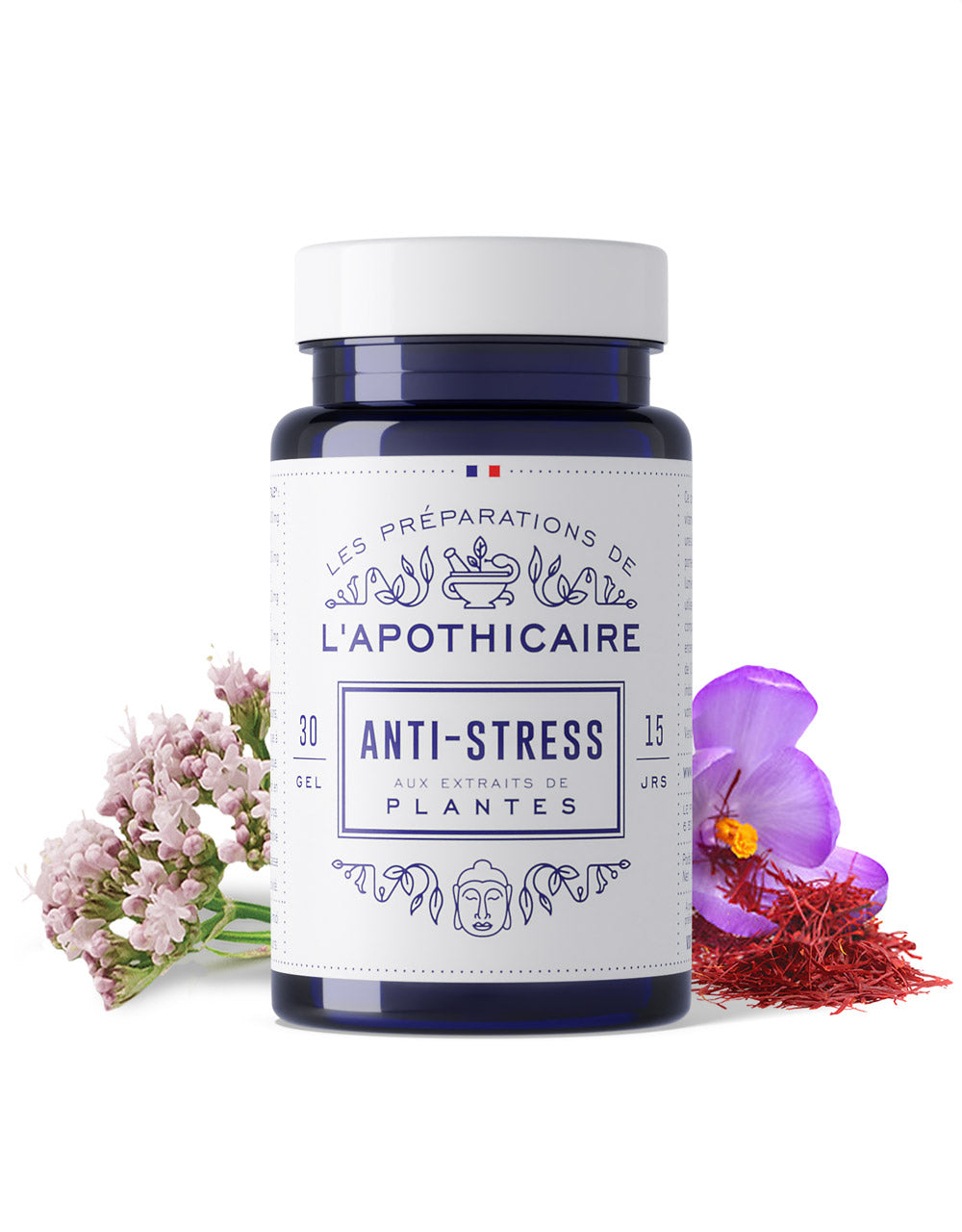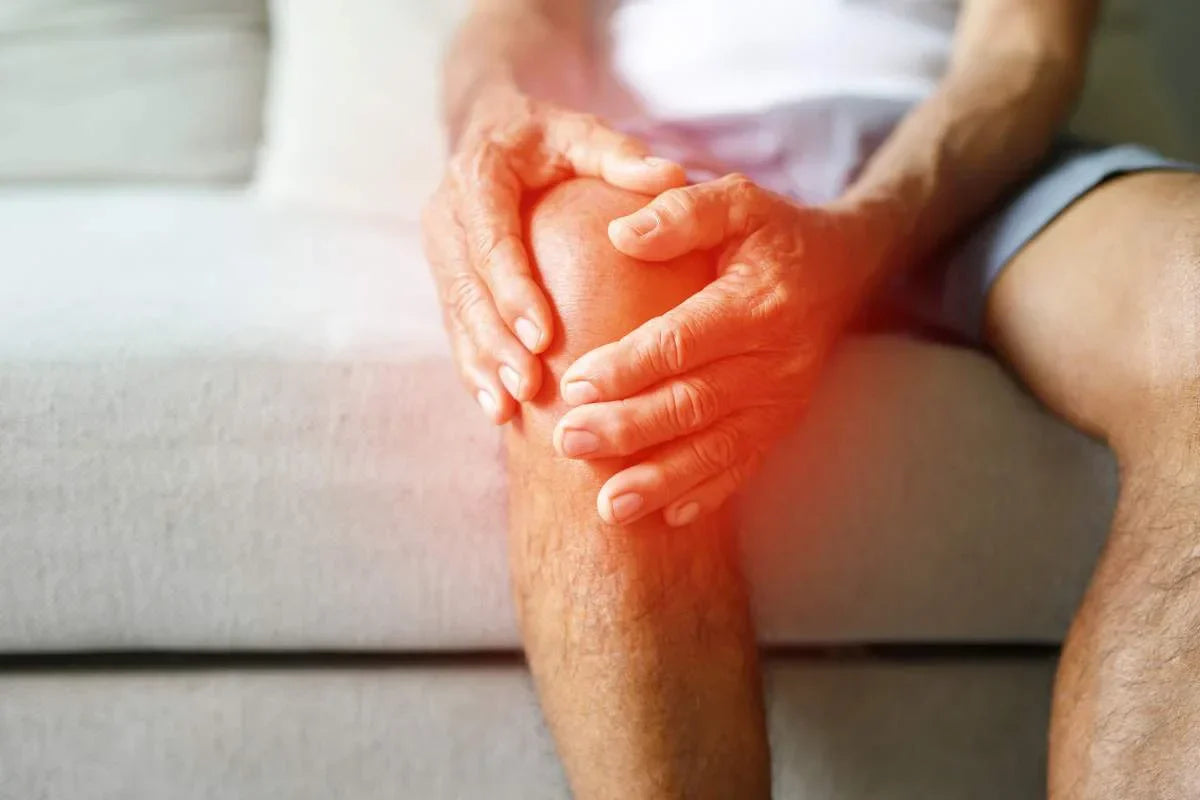Iron deficiency is a common health problem that can have a significant impact on physical and mental well-being. In addition to its effects on energy and physical performance, a lack of iron can also increase anxiety disorders and stress.
In this article, we'll explore the role of iron in health, understand how iron deficiency can affect anxiety, and discover ways to improve your iron levels while reducing stress.
- The role of iron in health
- Causes of iron deficiency
- Symptoms of iron deficiency
- Why can iron deficiency increase stress?
- What solutions are there to reduce stress and improve iron deficiency?
The role of iron in health
Iron is an essential element for the proper functioning of the body. It plays a role in the transport of oxygen, participating in the formation of:
- hemoglobin , the protein in red blood cells that carries oxygen from the lungs to all the cells in the body,
- and myoglobin , which provides oxygenation to the muscles.
Iron is also essential for energy production at the cellular level, participating in biochemical reactions that convert nutrients into energy. This helps prevent fatigue and weakness. In addition, it helps support the immune system, playing a role in the production of enzymes and proteins needed to fight infections.
Cognitively, iron is important for proper brain function and neurotransmitter synthesis , influencing memory, learning, and mood regulation. A lack of iron can lead to iron deficiency anemia, a condition that results in a low red blood cell count and symptoms such as fatigue, dizziness, and paleness.
In pregnant women, iron requirements increase to support fetal growth and prevent maternal anemia , which is essential for a healthy pregnancy. In summary, iron is essential to maintain good health, support vital functions and avoid deficiencies.

Causes of iron deficiency
Insufficient iron intake in the diet
One of the main causes of iron deficiency is inadequate dietary intake. Iron is found in two forms in the diet:
- Heme iron , found mainly in meat and fish, is better absorbed by the body.
- Non-heme iron , from plant sources (vegetables, cereals, legumes), is less well absorbed.
People who eat a primarily vegetarian or vegan diet may be at higher risk of iron deficiency, especially if they don't eat enough iron-rich foods or don't combine them with foods that promote absorption (such as citrus fruits that are high in vitamin C).
Poor intestinal absorption
Even if you get enough iron in your diet, some conditions can reduce your body's ability to absorb it. These conditions include:
- digestive diseases such as celiac disease or Crohn's disease, which damage the intestinal wall and limit the absorption of nutrients, including iron.
- gastrointestinal surgeries : Procedures such as gastrectomy (partial or total removal of the stomach) or gastric bypass surgery can decrease iron absorption.
Blood loss
Iron is an essential component of hemoglobin, and regular blood loss leads to a decrease in iron stores in the body. The most common causes are:
- Heavy periods : Women with heavy periods are often at risk of iron deficiency because they lose blood each month without always compensating for the loss with sufficient iron intake.
- Digestive bleeding : Gastric ulcers, intestinal polyps, or hemorrhoids can cause chronic bleeding in the digestive tract, leading to progressive iron loss.
- Frequent blood donation : Regular blood donors can deplete their iron stores, especially if their diet does not provide enough iron to compensate for these losses.

Additional iron requirements
Certain periods of life or conditions increase the need for iron. If these needs are not met, this can lead to a deficiency. These situations include:
- Pregnancy : During pregnancy, iron requirements increase to support fetal growth and prepare the mother for childbirth. If iron intake is not increased, a deficiency may develop.
- Rapid growth : In children and adolescents, rapid growth increases the need for iron to allow for muscle and tissue development.
- Breastfeeding : Breastfeeding mothers also have increased iron requirements to meet both their own needs and those of their babies.
Chronic inflammation or infections
Certain chronic diseases, such as infections, cancers, or chronic inflammatory diseases, can interfere with how the body uses and stores iron .
During times of inflammation, the body may restrict iron use to limit the proliferation of pathogens, but this can also lead to a decrease in iron stores available to the body.
Some medications
Some medications can affect the body's ability to absorb iron. For example:
- Antacids or medications that inhibit stomach acid production (such as proton pump inhibitors) may reduce iron absorption, because an acidic environment is necessary for optimal absorption.
- Aspirin or nonsteroidal anti-inflammatory drugs (NSAIDs) can cause minor but chronic gastrointestinal bleeding, leading to long-term iron loss.
Symptoms of iron deficiency
Iron deficiency anemia, or iron deficiency anemia, occurs when the body does not have enough iron to produce hemoglobin , a protein essential for carrying oxygen in the blood.
This can cause various symptoms that affect both the body and the mind. Iron plays a key role in many biological functions, and its deficiency can lead to physical and psychological signs, more or less severe depending on the severity of the deficiency.

Physical symptoms
Physical symptoms of iron deficiency often include signs of fatigue and general weakness . The most common ones are:
- Excessive fatigue : Because the body has less hemoglobin to carry oxygen, muscles and organs receive less energy, leading to a feeling of constant fatigue even after adequate rest.
- Pallor : Decreased red blood cells result in a pale complexion, most noticeable on the face, palms of the hands, and inside the eyelids.
- Shortness of breath : Lack of oxygen makes physical exertion more difficult, even at low intensity, which can cause rapid shortness of breath.
- Heart palpitations : The heart has to work harder to compensate for the lack of oxygen in the blood, which can cause a rapid or irregular heartbeat (palpitations).
- Brittle nails and hair : Iron deficiency can affect the health of nails, making them brittle, and cause hair loss.
- Headaches and dizziness : Poor oxygenation of the brain due to lack of iron can cause frequent headaches and feelings of dizziness.
- Restless legs syndrome : Some people feel an irresistible urge to move their legs, especially at night, a symptom sometimes linked to iron deficiency.
Psychological symptoms
In addition to physical manifestations, iron deficiency can also have psychological repercussions. The most common are:
- Irritability : Iron deficiency can affect mood, making people more irritable or even anxious for no apparent reason.
- Difficulty concentrating : Not getting enough oxygen to the brain can impair your ability to concentrate, making it difficult to focus on tasks or think clearly.
- Depression : Although iron deficiency is not directly responsible for depression, it can contribute to the onset of depressive symptoms, such as sadness, loss of interest, or discouragement.
- Sleep disturbances : Iron deficiency can also disrupt sleep, causing insomnia or frequent awakenings, which worsens the feeling of fatigue.
Why can iron deficiency increase stress?
Iron deficiency can increase stress for several reasons, primarily related to the essential roles iron plays in body function, including energy production and brain function management.
Impact of iron on oxygenation of the body and brain
Iron is a key element in the production of hemoglobin, a protein found in red blood cells that carries oxygen from the lungs to organs and tissues, including the brain . When iron is deficient, this oxygen-carrying capacity is reduced, leading to hypoxia (lack of oxygen) in the cells.
The brain is a very sensitive organ to oxygen. A deficiency in iron can cause symptoms such as fatigue, decreased concentration, and a feeling of mental exhaustion. When the brain does not receive enough oxygen, it becomes more vulnerable to psychological stress because it has to work harder to complete the same cognitive tasks. This can lead to symptoms of anxiety and irritability, thus increasing the stress response .

Neurotransmitter production and stress management
Iron also plays a role in the synthesis of neurotransmitters such as dopamine, serotonin and norepinephrine , which are essential for regulating mood and stress.
Iron deficiency can disrupt the production of these neurotransmitters , which can lead to chemical imbalances in the brain, promoting symptoms of anxiety, depression, or stress.
For example, dopamine is involved in controlling emotions and stress responses . A lack of iron can decrease the availability of this neurotransmitter, increasing vulnerability to intense stress reactions.
Fatigue and reduced resistance to stress
Chronic fatigue is one of the main symptoms of iron deficiency. When the body lacks energy, it becomes more difficult to cope with the physical and mental demands of everyday life . This fatigue can worsen feelings of stress, as the body and mind are less resilient to pressures and challenges.
Iron is also involved in the production of ATP (adenosine triphosphate) , the molecule that provides energy to our cells. Without enough iron, the body produces less ATP, leading to an overall decrease in physical and mental energy . This lack of energy makes the individual more susceptible to stress, as they have fewer resources to cope with stressful situations.
Weakened immune system and stress
Iron deficiency can also weaken the immune system, making the body more vulnerable to infections and illnesses. Reduced immunity can be an additional source of stress on the body , as people feel sick or weak more often. This physical stress due to poor general health can amplify mental and emotional stress.
What solutions are there to reduce stress and improve iron deficiency?
Adopt a diet rich in iron
Regularly consuming iron-rich foods such as red meat, fish, legumes, eggs and green leafy vegetables (spinach, kale) is recommended to compensate for an iron deficiency.
Additionally, combining these foods with sources of vitamin C (such as citrus fruits, peppers or red fruits) improves the absorption of non-heme iron (iron of plant origin).
Take supplements if necessary
In case of deficiency, you can turn to suitable iron supplements, being careful about the type of iron .
Indeed, the supplements currently prescribed and reimbursed by social security such as TARDYFERON or FERROGRAD can cause digestive pain due to their poor assimilation. Iron bisglycinate is much better assimilated .
These supplements are often prescribed in the form of tablets or syrup and can quickly increase iron levels in the body.
For better absorption, it is advisable to take these supplements with vitamin C, which promotes the assimilation of iron.

Relieve your stress and avoid iron deficiency with our capsules!
Our formula based on natural ingredients reduces fatigue and soothes tension
Discover the anti-stress capsules!Avoid drinks that reduce iron absorption
Tannins in coffee and tea decrease the absorption of non-heme iron . It is recommended to space out their consumption from iron-rich meals or replace them with herbal infusions.
Practice stress management techniques
Stress can make anxiety related to iron deficiency worse.
To reduce stress, it is recommended to adopt techniques such as:
- Meditation : Mindfulness meditation helps reduce anxiety by learning to focus your mind on the present moment.
- Yoga : This practice combines breathing exercises and gentle postures, helping to improve relaxation and stress management.
- Sophrology : a dynamic relaxation method, using breathing and visualization techniques to reduce stress.
- Regular physical activity : Exercise releases endorphins, the feel-good hormones, which help combat stress and anxiety.
Maintain a healthy lifestyle
Getting quality sleep and a balanced routine, including regular physical activity (such as walking or swimming), helps reduce stress and improve overall energy, helping combat symptoms of iron deficiency.
Iron deficiency can have far broader consequences than just physical fatigue. By affecting energy production and neurotransmitter regulation, it can significantly increase vulnerability to stress and anxiety.
Fortunately, there are solutions to correct this imbalance, including through a suitable diet, supplements if necessary, and good stress management. Acting on both fronts not only helps restore optimal iron levels, but also improves overall well-being and resilience to daily challenges.







